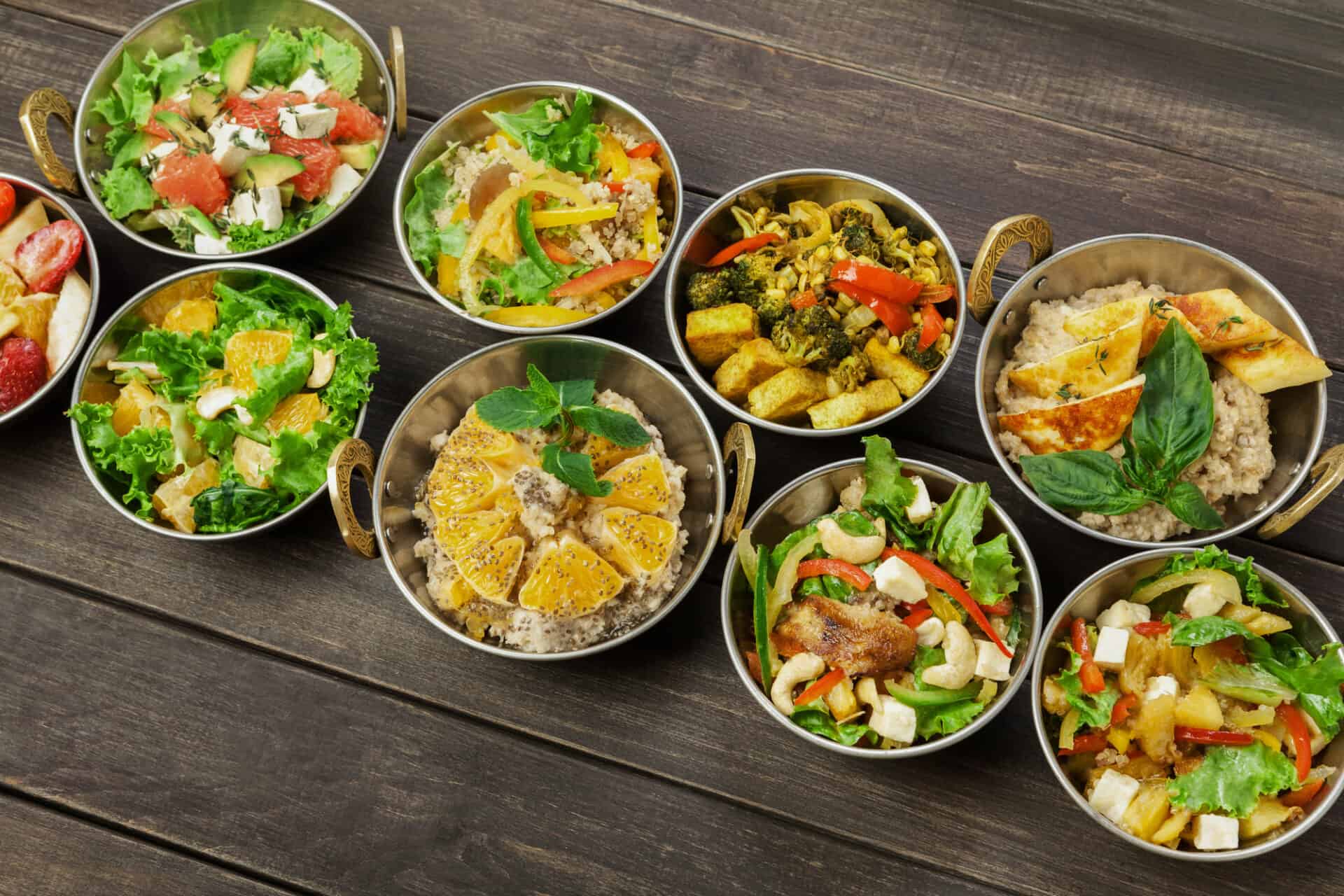Eating plant-based food while traveling is an excellent way to prevent animal suffering and reduce environmental impact. The meat industry is the most environmentally polluting industry in the world and plant-based diets are healthier and more sustainable than diets with animal products, as they require fewer resources and produce fewer emissions.
The basis of a healthy and more plant-based diet is to choose plenty of vegetables, fruits, whole grains, unsalted nuts, and legumes. Also, consider tofu, tempeh, seeds, and plant-based soft fats and oils. These plant-based products provide important nutrients. For example, you can obtain proteins and iron from whole grains, nuts, and legumes. Eating more plant-based has a positive effect on the climate, animal welfare, and your health. If you eat 100 grams of chicken, you will consume about 22 grams of protein. But for the same amount of protein, you can eat 200 grams of spinach, 100 grams of beans, and 100 grams of tofu. The combination of these three provides not only protein but also a wide range of minerals, vitamins, and fibres.
Difference between vegan and plant-based:
The terms “vegan” and “plant-based” are often used interchangeably, but there is a subtle difference in their meanings:
A vegan diet is a form of vegetarianism that excludes all animal products and by-products. This means avoiding not only meat and seafood but also dairy products, eggs, honey, and any other ingredients derived from animals. Vegans not only follow a plant-based diet but also extend their lifestyle choices to exclude the use of animal products in clothing, cosmetics, and other areas of their lives.
A plant-based diet, on the other hand, focuses primarily on consuming foods derived from plants, such as fruits, vegetables, whole grains, legumes, nuts, and seeds. While a plant-based diet does emphasize the consumption of plant foods, it does not necessarily exclude all animal products.
Put legumes on the menu
Legumes like beans, lentils, and chickpeas are the ultimate meat substitutes. These little powerhouses are packed with protein, fiber, vitamin B, and minerals. And to top it off, they are generally cheaper than meat. A small adjustment with a big impact.
Vegetarian and vegan accommodations:
On VeggieHotels you will find hotels and B&Bs that offer 100% vegetarian or vegan cuisine. Many accommodations also serve organic food and have been designed with sustainability in mind. Some even produce their own organic vegetables and fruits, offering farm-to-table slow food experiences. It has become much easier to enjoy plant-based food while traveling!
Vegan friendly hotels:
VeganWelcome presents hotels with vegan-friendly cuisine for a healthy and sustainable vacation, from trendy city hotels to sustainable luxury resorts and hiking hotels with vegan offers.
Vegan-friendly cities:
Tel Aviv is the vegan capital of the world and Berlin is the vegan capital of Europe. Other vegan-friendly European cities are Krakow, Lisbon, London, Amsterdam, Prague, Madrid, Warsaw, Paris, Edinburgh, Dublin, Copenhagen, Budapest, Barcelona, Turin, Bristol, Ghent, Helsinki, Zurich, Glasgow, Manchester, Brighton and Malmo. There are several cities around the world that are known for being particularly vegan-friendly, offering a wide range of options and a supportive environment for vegans. While this list is not exhaustive, here are some notable vegan-friendly cities:
Berlin, Germany
Berlin has a thriving vegan scene, with numerous vegan restaurants, cafes, and even vegan supermarkets. The city hosts Veganes Sommerfest, Europe’s largest vegan festival, attracting thousands of visitors each year. It’s also home to the world’s first vegan-only avenue, Schivelbeiner Straße.
Portland, Oregon, USA
Portland is often considered one of the most vegan-friendly cities in the United States. It offers a plethora of vegan and vegetarian restaurants, food trucks, and vegan-friendly businesses. The city also hosts the annual Vegan Beer and Food Festival, highlighting its vibrant vegan culture.
Tel Aviv, Israel
Tel Aviv has a rapidly growing vegan scene, with an abundance of vegan eateries and vegan options in non-vegan restaurants. The city even boasts a vegan street fair, an all-vegan supermarket, and vegan-friendly hotels. Tel Aviv was also named the world’s vegan capital by a British travel agency in 2017.
London, United Kingdom
London has seen a substantial increase in vegan options in recent years, with a growing number of vegan restaurants, cafes, and markets. Vegan festivals and events are also common in the city, catering to the growing demand for plant-based dining and promoting veganism.
Melbourne, Australia
Melbourne has a vibrant vegan food scene, with countless vegan cafes, restaurants, and street food options. The city regularly hosts the World Vegan Day festival, attracting thousands of attendees. The abundance of vegan choices and vegan-friendly initiatives make Melbourne a popular destination for vegans.
Taipei, Taiwan
Taipei has embraced veganism and offers a wide range of vegan restaurants and food stalls. The city is famous for its night markets, where you can find a variety of vegan street food options. Taipei also hosts the annual Taipei Vegan Frenzy, showcasing the diverse vegan food culture of the city.
Warsaw, Poland
Warsaw has experienced significant growth in vegan offerings, with a rise in the number of vegan restaurants, cafes, and food trucks. The annual Veganmania festival celebrates veganism and promotes ethical dining options in the city.
These cities have distinguished themselves by embracing veganism and providing a welcoming environment for vegans and plant-based enthusiasts. However, it’s worth mentioning that vegan options are becoming more widely available in many cities worldwide as the demand for plant-based dining continues to grow.
Find a good restaurant near you
Want to enjoy plant-based food while traveling? HappyCow is an app and website listing vegan, plant-based and vegetarian restaurants worldwide.
Worldwide restaurants with MICHELIN stars for their meat-free, plant-based cuisines

This article is part of the series by Conscious Travel Guide, your resource for mindful globetrotting.


